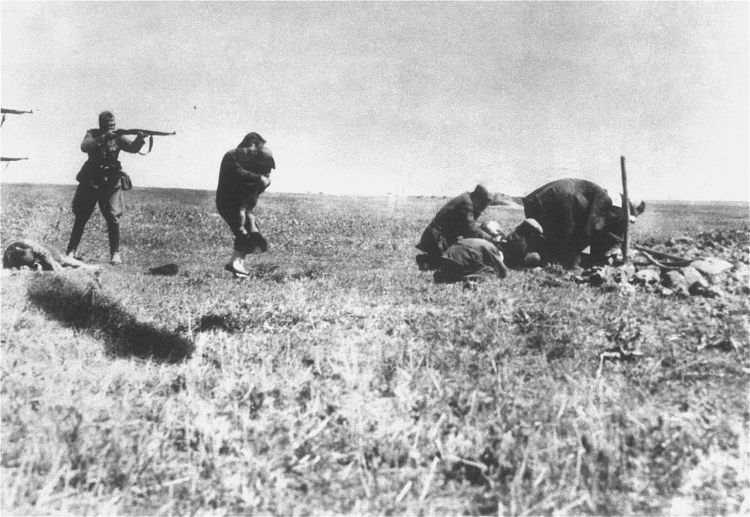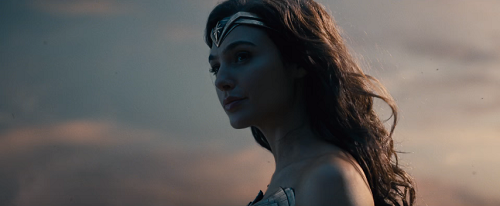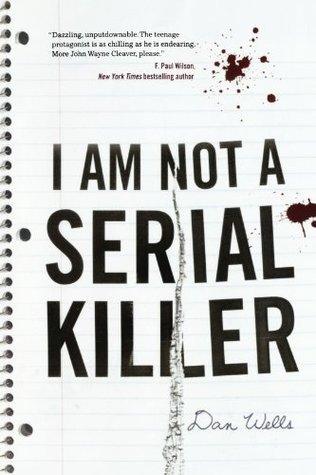Among other things, Life and Fate is an important contribution to the literature of the Holocaust. The Holocaust touched Grossman personally. I’ve referred now a couple of times in these posts on the novel to his essay “The Hell of Treblinka.” Grossman was with the Red Army when it arrived at the former killing center, which the Germans had largely abandoned in 1943. His investigative journalism, including interviews with many of the local Poles, produced one of the earliest documents we have about the camps. But the Holocaust touched Grossman in a much more personal way. His mother was murdered in their hometown of Berdichev when the Germans invaded the Ukraine in the summer of 1941.
One of the novel’s most famous chapters contains the text of a letter from Anna Semyonovna, Viktor’s mother, to her son. Smuggled out just before the Berdichev ghetto is liquidated, the letter is a clear, careful, and enormously moving description of how quickly life turned upside down for the Jews of Ukraine in the summer of 1941. It is also Grossman’s homage to his mother; she was never able to send him anything comparable. Like his stand-in, Viktor, Grossman was plagued his whole life by guilt that he wasn’t able to get her to safety in Moscow before the German invasion.
The letter shows how fast life was overturned for the Jews of Berchidev. No sooner had the Germans arrived than many of the locals—even former friends and neighbours—feel emboldened to take over their apartments and steal their things. In a matter of days, the Germans announce the construction of a ghetto where all Jews are required to move. The ghetto is horrible—everyone hungry, sick, despairing. But it’s better than that brief period before. Anna concludes: “Now I’m no longer a beast deprived of rights—simply an unfortunate human being. And that’s easier to bear.”
Anna’s letter is filled with similar heartbreaking and pithy claims. “Nowhere is there so much hope as in the ghetto,” she writes. Anna describes herself seeing patients (she is an eye doctor) and saying “Now bathe your eye regularly with the lotion and it will be better in two or three weeks” when the signs are clear they will all be murdered soon:
The Jews who were sent to dig potatoes are digging deep ditches four versts from the town, near the airfield, on the road to Romanovka. Remember that name, Vitya—that’s where you’ll find the mass grave where your mother is buried.
She imagines herself becoming nothing but a faint memory, imagines some of her non-Jewish neighbours saying: “‘And there was a doctor who used to sit there, beneath that old pear-tree—I can’t remember her surname but once I went to her to have my eyes treated. After she finished world she use to bring out a wickerwork chair and sit there with a book.’ Yes, Vitya, that’s how it will be.”
I defy anyone to read this chapter with a dry eye.

In addition to showing the complicity of the local population in the Nazi murder of Ukrainian Jews and daring to suggest that the crimes of Nazism and Stalinism were no so different, Grossman’s other big crime, as far as the Soviet authorities were concerned, was to assert that Jews suffered inordinately in the German invasion. That might seem obvious to us, but it was a brave, dangerous thing to say in the USSR in the 1950s. As translator Robert Chandler notes in his introduction, this was the time of the slogan “Do not divide the dead!” That is, all victims of fascism were supposed to be the same: all Soviets suffered together. Grossman challenges this orthodoxy in Life and Fate.
Indeed, one of the tragedies of the Holocaust in the Soviet Union is that many Jews there no longer or had never thought of themselves as Jewish. (This was true elsewhere in Europe too.) Viktor and his mother feel this way, as did Grossman himself. In a characteristically fine review of the novel, Adam Kirsch points out how Soviet modernity had transformed Jewish life, taking people out of the shtetls that persisted elsewhere in Eastern Europe (and in the USSR as well), bringing them to cities like Berdichev (prewar population 60,000, half of them Jewish), and allowing them access to all sorts of professions.
This transformation of Jewish life is evident in the novel. After being captured by the Germans outside Stalingrad, Sofya Levinton, an army doctor who is the other main Jewish character in the novel, is eventually deported to a concentration camp. In the cattle-car she studies her fellow prisoners and reflects on how the world of her childhood has changed:
The cattle-wagon was full of workers from different co-operatives, girls at teacher-training college, teachers from a school for trade unionists; there was a radio technician, an engineer who worked at a canned-food factory, a livestock expert, and a girl who worked as a vet. Previously, such professions had been unheard of in the shtetl.
As you can see from this example, the lists I discussed last time are present in the Holocaust sections of the book as well. Grossman uses them to show the enormous scope of Jewish persecution, as well as to remind readers that the Nazi-sponsored genocide affected Jews from across Europe and from all walks of life. In a powerful scene, Grossman depicts a meeting between (the fictional) SS Obersturmbannführer Liss and Adolf Eichmann, who reveals to him the plans for the Final Solution:
‘Can you give me some idea—just a rough estimate—of the number of Jews we’re talking about?’ …
Eichmann answered his question.
‘What?’ Liss gasped in astonishment. ‘Millions?’
Eichmann shrugged his shoulders.”
Riding in a limousine on the way to the meeting, Liss dreams of his future. Grossman interrupts his reverie with a kind of documentary overview of the coming destruction that is clearly not from Liss’s point of view:
Smolevichi [today in Belarus] is full of quiet little houses with gardens; grass grows on the pavements. In the slums of Berchidev there are dirty hens running around in the dust, their yellow legs marked with red and violet ink. In Kiev—on Vassilievskaya Avenue and in the Podol—there are tall buildings with dirty windows, staircases whose steps have been worn down by millions of children’s shoes and old men’s slippers.
In yards all over Odessa stand tall plane trees with peeling bark. Brightly-coloured clothes and linen are drying on the line. Pans of cherry jam are steaming on cookers. New-born babies with swarthy skin—skin that has yet to see the sun—are screaming in cradles.
On the six floors of a gaunt, narrow-shouldered building in Warsaw live seamstresses, book-binders, private tutors, cabaret-singers, students and watchmakers…
In Stalindorf [a Jewish agricultural colony in the Ukraine, established in 1924] people light fires in their huts in the evening. The wind blows from Perekop [on the isthmus between Ukraine and Crimea], smelling of salt and warm dust. Cows shake their heavy heads and moo…
In Budapest and Fastov [Ukraine], in Vienna, Melitopol [Ukraine] and Amsterdam, in detached houses with sparkling windows, in hovels swathed in factory smoke, lived people belonging to the Jewish nation.
The barbed wire of the camps, the clay of the anti-tank ditches and the walls of the gas ovens brought together millions of people of different ages, professions and languages, people with different material concerns and different spiritual belies. All of them—fanatical believers and fanatical atheists, workers and scroungers, doctors and tradesmen, sages and idiots, thieves, contemplatives, saints and idealists—were to be exterminated.
This passage is a good example of Grossman’s tendency to intersperse the narrative with little mini-essays or pieces of reportage (I gather Tolstoy does something similar with his writings on history in War & Peace). It’s also a clear statement of Jewish identity, really extraordinary given the ideological dreams and political realities of Soviet life.
Eventually, it becomes clear that Sofya not Victor is the novel’s main stand-in for the Jewish people. She is just as vivid, sympathetic, and moving a character as Viktor’s mother, Anna. Shortly after the passage I cited earlier about all the professions represented in the cattle-car, Sofya begins to think of herself as a member of a communal Jewish identity, addressing the others on the transport as Brider yidn (Fellow Jews). (Compare Anna: “But now, during these terrible days, my heart has become filled with a maternal tenderness towards the Jewish people. I never knew this love before.”)
Many pages later, when Sofya and the others are forced into the gas chamber, we’re given a passage that moves from individual Jewish bodies to the collective body of the Jewish people, from corporeal to historical continuity:
When a man has no clothes on, he draws closer to himself. ‘God, the hairs on my chest are thicker and wirier than ever—and what a lot of grey!’ ‘How ugly my fingernails look!’ There’s only one thing a naked man can say as he looks at himself: ‘Yes, here I am. This is me!’ He recognizes himself and identifies his ‘I’, an ‘I’ that remains always the same. A little boy crosses his skinny arms over his bony chest, looks at his frog-like body and says, ‘This is me’; fifty years later he looks at a plump, flabby chest, at the blue, knotted veins on his legs and says, ‘This is me’.
But Sofya Levinton noticed something else. I was as though the body of a whole people, previously covered over by layers of rags, was laid bare in these naked bodies of all ages: the skinny little boy with the big nose over whom an old woman had shaken her head and said, ‘Poor little Hassid!’; the fourteen-year old girl who was admired even here by hundreds of eyes; the feeble and deformed old men and women who aroused everyone’s pitying respect; men with strong backs covered in hair; women with large breasts and prominently veined legs. It was as though she felt, not just about herself, but about her whole people: ‘Yes, here I am.’ This was the naked body of a people: young and old, robust and feeble, with bright curly hair and with pale grey hair.
The scholar Marat Grinberg—more from him next time!—has observed that Sofya here references the hineni (Here I am!) of Abraham’s response to God in the story of the Akedah, that is, the binding of Isaac. It’s amazing to see the secular, atheist, Communist Grossman, who grew up without a traditional Jewish education, cite this central moment from what might be the most powerful and puzzling story in all of Torah. It’s even harder to know how to understand this choice. Is Grossman suggesting, via the biblical allusion, that even in the hell of the camps God will somehow look out for, even validate Jewish suffering? What could that possibly mean? These people are about to be murdered—unlike in “The Hell of Treblinka,” where Grossman also imagines a scene in the gas chamber but pulls away at the last moment, as if to say the moment of the death is beyond representation, here he actually depicts the death of Sofya and the rest:
Her heart, however, still had life in it: it contracted, ached and felt pity for all of you, both living and dead; Sofya Osipovna felt a wave of nausea. She pressed David [a little boy she cares for on the journey to death], now a doll, to herself; she became dead, a doll.
Is the “you” in this powerful passage meant to refer to Jews? To all human beings, even those who are on the other side of the doors, peeping through the porthole window? To us as readers?
Or is the reference to the hinenei supposed to be ironic? Is Grossman saying, despairingly, contemptuously: This is what has happened to the faith in the 20th century? I don’t think so. I think Grossman is wrestling with the relation between individual human life, which he values so much, as I’ve shown over and over in these posts, and group identity, which he wasn’t allowed to value except through the idea of Soviet or communist identity.
Although there’s a lot more to say about the role of the Holocaust in Grossman’s self-understanding and in the novel, I’ll finish by simply pointing out a few of the moving characters Grossman offers us.
There’s Rebekkah Bukhman, who strangles her baby when it begins crying in the hiding place from which she and her family are nonetheless wrenched during a house-to-house search in a ghetto. There’s Naum Rozenberg, an accountant forced to become a Brenner, one who burned the bodies of those shot by the SS Einsatzgruppen; Rozenberg has miraculously survived the liquidation of his unit only to be recaptured by the Germans and deported to Treblinka; he spends the train ride in a fugue state, calculating exactly how many bodies he was forced to burn. There’s an unnamed man, distinguished only by his raised collar, who suddenly shrugs his shoulders as the column of new arrivals is marched to the crematorium and “with a sudden nimble jump, as though he had spread his wings… punche[s] an SS guard in the face and knock[s] him to the ground.”
Grossman is too honest to simply ennoble the victims. Take a look at this passage, describing a husband and wife who are separated on the ramp and then by the so-called selection process. He is sent to work; she is sent to death. The passage starts out conventionally enough, just skirting piousness, but then takes a swerve that leaves false emotion far behind:
How can one convey the feelings of a man pressing his wife’s hand for the last time> How can one describe that last, quick look at a beloved face? Yes, and how can a man live with the merciless memory of how, during the silence of parting, he blinked for a moment to hide the crude joy he felt at having managed to save his life? How can he ever bury the memory if his wife handing him a packet containing her wedding ring, a rusk and some sugar-lumps? How can he continue to exist, seeing the glow in the sky flaring up with renewed strength? Now the hands he had kissed must be burning, now the eyes that had admired him, now the hair whose smell he could recognize in the darkness, now his children, his wife, his mother.
Yet he doesn’t blame the victims, either. That passage is like a punch to the gut because it acknowledges how the drive to live trumps every decent human emotion, even as it suggests how terrible it is that a person in that situation can, indeed must, become so callous. At the same time, though, the questions posed by the narrator aren’t just rhetorical. Grossman doesn’t let us forget that those of us who weren’t there struggle to understand. (Which isn’t the same as saying we can’t.) In an earlier passage, describing how the Nazis relied on their victims’ unwillingness to countenance what was happening to them “(A man cannot believe that he is about to be destroyed”), the narrator explains:
It is important to consider what a man must have suffered and endured in order to feel glad at the thought of his impending execution. It is especially important to consider this if one is inclined to moralize, to reproach the victims for their lack of resistance in conditions of which one has little conceptions.
In the vast and powerful literature of the Holocaust, few writers can convey more forcefully than Grossman the desire for life, which is as much physiological as metaphysical. In the gas chamber, the victims aren’t even animals—the way they squeeze into the room isn’t the way people move, not even the way “the lowest form of animal life moved”:
It was a movement without sense or purpose, with no trace of a living will being it. The stream of people flowed into the chamber; the people going in pushed the people already inside, the latter pushed their neighbours, and all these countless shoves and pushes with elbows, shoulders and stomachs gave rise to a form of movement identical in every respect to the streaming of molecules.
Yet even as, perversely, the air the victims desperately drive into their lungs only drives life out they remain human. The boy David, the one Sofya looks after, stands for them all. In the last minute, thinking of his summer with relatives in Ukraine, brutally interrupted by the Nazi invasion, David can’t let go of this life:
This world, where a chicken could run without its head, where there was milk in the morning and frogs he could get to dance by their front feet—this world still preoccupied him.
Next time, look for one last post on Life and Fate, a conversation with someone who really understands this book.
Advertisements Share this:




